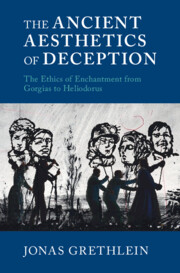Book contents
- The Ancient Aesthetics of Deception
- The Ancient Aesthetics of Deception
- Copyright page
- Contents
- List of Figures
- Acknowledgements
- Chapter 1 Gorgias and the Justice of Tragic Apatē
- Chapter 2 The Circulation and Significance of Apatē in the Classical Era
- Chapter 3 The Dramatic Entanglement of Aesthetic Illusion with Deceit in Sophocles’ Electra
- Chapter 4 Immersion and Corruption in Plato’s Republic
- Chapter 5 The Void of Hellenistic Criticism
- Chapter 6 The Appeal and Challenge of Apatē in Imperial Criticism: Plutarch’s De audiendis poetis
- Chapter 7 Lucian and the Spell of Philosophy
- Chapter 8 How to Read Ekphrasis: The Tabula Cebetis
- Chapter 9 Christian Polemics against Idolatry: Clement of Alexandria’s Protrepticus
- Chapter 10 The Aesthetics of Deception Reconfigured in Heliodorus’ Ethiopica
- Chapter 11 From Deepfake to Psychotherapy: The Aesthetics of Deception Today
- Bibliography
- Index Locorum
- General Index
Chapter 6 - The Appeal and Challenge of Apatē in Imperial Criticism: Plutarch’s De audiendis poetis
Published online by Cambridge University Press: 23 August 2021
- The Ancient Aesthetics of Deception
- The Ancient Aesthetics of Deception
- Copyright page
- Contents
- List of Figures
- Acknowledgements
- Chapter 1 Gorgias and the Justice of Tragic Apatē
- Chapter 2 The Circulation and Significance of Apatē in the Classical Era
- Chapter 3 The Dramatic Entanglement of Aesthetic Illusion with Deceit in Sophocles’ Electra
- Chapter 4 Immersion and Corruption in Plato’s Republic
- Chapter 5 The Void of Hellenistic Criticism
- Chapter 6 The Appeal and Challenge of Apatē in Imperial Criticism: Plutarch’s De audiendis poetis
- Chapter 7 Lucian and the Spell of Philosophy
- Chapter 8 How to Read Ekphrasis: The Tabula Cebetis
- Chapter 9 Christian Polemics against Idolatry: Clement of Alexandria’s Protrepticus
- Chapter 10 The Aesthetics of Deception Reconfigured in Heliodorus’ Ethiopica
- Chapter 11 From Deepfake to Psychotherapy: The Aesthetics of Deception Today
- Bibliography
- Index Locorum
- General Index
Summary
Plutarch’s De audiendis poetis, discussed in Chapter 6, is one of the first testimonies to the resuscitation of apatē as a critical term in the Imperial era. In defending the educational function of poetry, Plutarch is responding to Plato. While Plutarch’s positive view disagrees with Plato’s negative verdict, his argument, as I will argue, is predicated on Plato’s association of immersion with corruption. Plutarch, after acknowledging poetry’s spell, lays out a strongly reflexive mode of reading intended to render the young readers immune to the dangers of absorption. His agenda has been appraised as prefiguring the modern hermeneutics of suspicion, but there are also important differences to be noted. Besides drawing our attention to the role of Plato, De audiendis poetis suggests further reasons for the appeal of apatē in the Imperial era, notably a culture of rhetorical epideixis that put a premium on captivating performances and the socio-political function of literature for the Greek elites in the Roman empire that gave new prominence to its ethical dimension.
Keywords
- Type
- Chapter
- Information
- The Ancient Aesthetics of DeceptionThe Ethics of Enchantment from Gorgias to Heliodorus, pp. 137 - 165Publisher: Cambridge University PressPrint publication year: 2021

